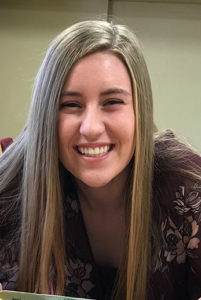
Erica Dougherty
When I was ten, I became a published author.
In truth, my literary “masterpiece” was a two-sentence tidbit of advice that I had submitted as part of a class project. My words were sent to an author, who printed them in a book.
“Happiness is the key to the door of your heart. Without happiness, your heart is just locked.”
When my youthful wisdom went to print, I felt like a celebrity. I was interviewed for the school news, signed copies of the book for my relatives and teachers, and even received an award from the school district for academic excellence.
I decided then that I wanted to be a writer, a decision that was met with overwhelming support.
Until, of course, I grew up.
In high school, I continued my love for writing by taking AP English classes and writing for the school newspaper, but the reactions from the people around me had changed.
Gone were the smiles, pats on the back, praises and encouragement. In their place, I received only questions and opinions.
“Why are you taking another AP English class? Take a science course instead; it will help you more.”
“You aren’t going to be an English major, are you? They make NO money.”
“I don’t think that writing will do much for you these days, no offense.”
Their words confused me. I did not understand why my dream of becoming a writer had suddenly become the death warrant for my success.
Over time, my love for writing and other art forms faded into the shadows of business and STEM. I convinced myself that the world had no permanent place for my interests, and no one contradicted me.
During the final days of my senior year, my AP Literature teacher asked my class to talk about their intended majors.
When my turn came, I spoke quickly and quietly.
“I plan to study Accounting.”
My teacher stared at me for a moment, then smiled and moved on to the next student. His smile was genuine, but there was no mistaking the confusion in his eyes.
He did not understand my choice. He did not understand that, to me, I did not have one.
When I came to Lehigh, I was ready to integrate myself in the world of business. I liked my accounting class in high school, and I knew that the field could offer me a successful, stable life if I worked hard enough.
In the business school, I met incredible students with impressive ambition. At 19 years old, many already had stock profiles, internships with Big Four companies and power suits that would put Barney Stinson’s to shame.
I was surrounded by so much talent and passion, and I had never felt more out of place. I did not enjoy my classes, I wanted nothing to do with Wall Street or T-accounts and I was trying so hard only to do so poorly.
For the first time in my life, I finally understood Nathaniel Hawthorne’s Hester Prynne. I was an impostor in a life that I had chosen, and I felt the painful, staggering weight of my own scarlet letter every time that I went to a lecture or a networking event.
A was for Arts, and I was incomplete without them.
In January of my sophomore year, I decided to start wearing my scarlet letter with pride instead of shame. With my parents’ encouraging support, I left the business school and declared a double major in English and journalism.
My immersion back into writing changed every perception about the arts had formed during my teen years. Art was not a hindrance to my personal and professional success, but rather, a key element to its existence.
With art back in my life, I finally had the confidence to seek out friends, organizations and opportunities that I never would have pursued otherwise. I felt unique, empowered, significant and, most importantly, happy.
As it turns out, my juvenile advice held some truth. Art is the key to my happiness, and without it, my heart was locked. By opening it back up, I gave myself the chance to succeed not only in academics, but also in life.
In my opinion, it’s a key worth finding.





Comment policy
Comments posted to The Brown and White website are reviewed by a moderator before being approved. Incendiary speech or harassing language, including comments targeted at individuals, may be deemed unacceptable and not published. Spam and other soliciting will also be declined.
The Brown and White also reserves the right to not publish entirely anonymous comments.
1 Comment
“Happiness is the key to the door of your heart. Without happiness, your heart is just locked.” Truly this is a profound thought. Unfortunately it is not the key to financial stability. Doing the best you can in a field that makes you happy and fulfilled is a valid and is a path that will also be useful to others.
Writing is necessary skill that many do not have and are not interested in attaining. Writing with intelligence is sorely needed in our society where billions of words are wasted in blogs and tweets meant to enhance egos and spread dissension and venom. I look forward for The Brown and White to report, inform and educate and every once in a while to be uplifted.